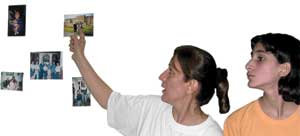 The enemy of an enemy should be a friend. But it doesn't seem to work quite that way in geopolitics. A divided Iraqi Christian refugee family in Kathmandu is testimony to how humanitarian concerns don't figure in the present sabre-rattling against Iraq and the "axis of evil".
The enemy of an enemy should be a friend. But it doesn't seem to work quite that way in geopolitics. A divided Iraqi Christian refugee family in Kathmandu is testimony to how humanitarian concerns don't figure in the present sabre-rattling against Iraq and the "axis of evil". 
Two years ago the Kandal family fled Iraq to escape persecution by Saddam Hussein. But while the father and two daughters are in a refugee camp in Germany, the mother and three other children are waiting in Kathmandu for someone to help re-unite them. They are trapped between unfeeling embassies, Nepal's own rigid laws that make no humanitarian exceptions, and a United Nations that has its own rules on refugee status.
Liliah Kandal is a petite 47-year-old woman with a radiant face who could easily be mistaken for a kindergarten teacher. In a cramped flat in Kathmandu, Liliah, her two daughters Dina and Dayana, and her son, Sargon, are trying their best not to give up hope. "All we can do is pray and trust that our family will be one again," Liliah says, showing us family photographs stuck to the wall of her tiny room.
Governments and relief agencies haven't been of much help, but a fellow refugee from Iraq's erstwhile enemy Iran came to the rescue. An American good samaritan then assisted with living expenses. Still, local missionary schools don't want to take the children because they do not have any documents. Then there is the stress and boredom of living in alien surroundings, and an overwhelming sense of uncertainty about the future.
After her husband sought political asylum in Germany two years ago, Liliah took their five children and travelled via Jordan and Thailand to try to join him. In Bangkok, a human smuggling ring organised to take them to Germany via Kathmandu with fake French passports. The eldest and youngest daughters, who were on one passport, went through Kathmandu airport departure immigration, that morning a year-and-half ago. But Lilliah and her three other children were caught.
They posted a Rs 180,000 bail for one year while the case was under investigation. But now they could be taken to court and, if convicted for travelling on forged documents, face jail sentences of a maximum of five years. It would be possible to convince the judge that deportation, rather than sentencing, would be better for all concerned.
The United Nations refugee agency in Kathmandu, UNHCR, is trying to help, but can't give them refugee status until the case is tried. Even then, the UNHCR says that it can only return them to northern Iraq. Liliah would prefer to go to Jordan, where she thinks it will be safer for her family, and from where will be more chance of reuniting with her husband and two other daughters.
Last week, Liliah wrote a petition requesting King Gyanendra for a royal pardon, and to be allowed to leave the country on humanitarian grounds.


